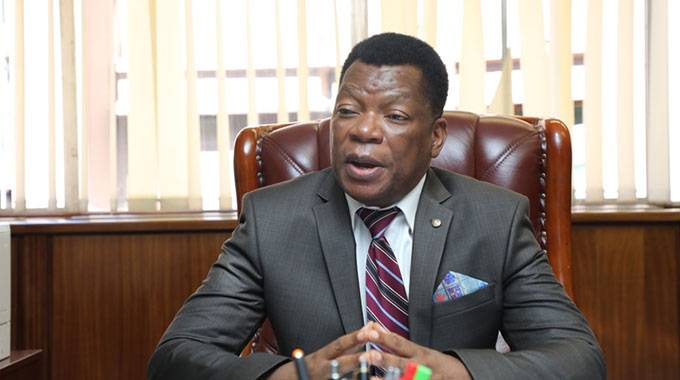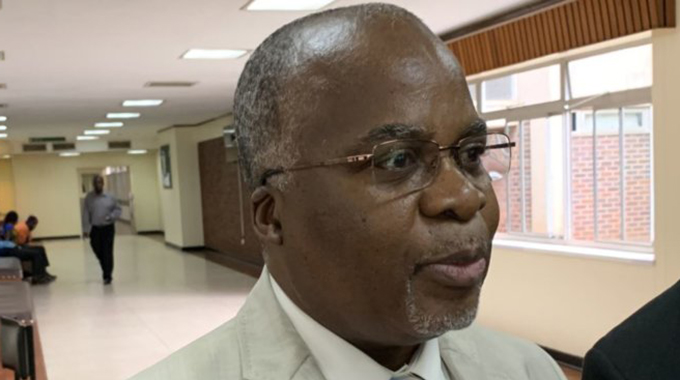PG Hodzi’s appointment above board, court rules

Fidelis Munyoro
Chief Court Reporter
When President Mnangagwa chose Mr Kumbirai Hodzi as the Prosecutor General after asking the Judicial Service Commission for a second list of nominees he was exercising his constitutional discretion to seek a second list and then to decide, which candidate submitted to him by the commission was the best fit for the post, the Constitutional Court ruled unanimously yesterday.
Under the Constitution, the commission gives a list of three names to the President, who can then ask for a second list of three, but then has to choose one. No further lists can be asked for and any appointment has to come from a list submitted by the commission. The same process is used to choose judges.
Lawyer Joshua Chirambwe had petitioned the Constitutional Court to nullify Mr Hodzi’s appointment as the substantive Prosecutor General of Zimbabwe, on several grounds.
He brought up the rights and prerogatives of the President and the process of making such appointments, which the court answered fully and carefully in rejecting his application saying the process laid out in the Constitution had been followed to the letter and the President had acted within his constitutional powers.
Chirambwe also attacked Mr Hodzi’s fitness for the post, claiming he had failed public interviews held to replace Advocate Ray Goba, who had quit.
Others interviewed included Calvin Mantsebo, Tinomudaishe Chinyoka, Misheck Hogwe, Jessie Majome, Justice Maphios Cheda, Wendy Chingeya, Florence Ziyambi, Edios Marondedza and Noria Mashumba.
He then made wild and personal allegations concerning the President, Judicial Service Commission and Chief Justice Luke Malaba, without in the words of the judgment one iota of evidence , and as a result was hammered with the costs of the suit, unusual in constitutional cases.
When going into the pure constitutional issues, Chirambwe contended that there is an unwritten but implied obligation imposed on the President to state the reasons for rejecting a list given to him by the Judicial Service Commission.
But the full complement of the Constitutional Court, when unanimously throwing out the application by Chirambwe, held that there is no constitutional obligation on the President to give reasons for rejecting the first list submitted to him by the Judicial Service Commission.
Writing the judgment for the full court, Justice Paddington Garwe said President Mnangagwa was endowed by the Constitution with a prerogative power to use his discretion in determining whether or not the candidates submitted to him are suitable for appointment.
He said the Constitution made this clear, stressing that the only restriction to the power of the President was that he is mandated to appoint one of the nominees recommended to him by the Judicial Service Commission on the second list if he did not choose one from the first list.
“There is also no specific or implied requirement for a second interview to be conducted for the purposes of compiling the second list,” said Justice Garwe.
“The Constitution does not impose on the President the obligation to ensure that a second round of interviews is conducted by the Judicial Service Commission once he rejects the names on the first list submitted to him.”
When swinging off the constitutional issues into the wild side, Chirambwe also made an allegation that the President brought pressure to bear on the Chief Justice to create a second list with Mr Hodzi’s name on it. There was no evidence of this whatsoever and so the court rejected the allegation in total.
Justice Garwe whacked Chirambwe for making wild personal allegations against the President, Judicial Service Commission and Chief Justice Luke Malaba, all listed in the matter as respondents, without any justification. This was besides his more measured constitutional questions about the powers of the President when making appointments and whether the President had to explain his choices.
And to show the court’s displeasure on the inappropriate conduct of Chirambwe when he went personal, the court ordered him to pay the costs of litigation, which is unusual in constitutional matters.
“On the question of costs, I consider that a costs order is warranted in this case,” said Justice Garwe.
“Scurrilous allegations, based on hearsay and imputing criminal conduct, have been made against the President, the Judicial Service Commission and the Chief Justice. No iota of evidence has been produced to back up such serious allegations.”
Justice Garwe said while it was the normal practice in constitutional matters not to mulct a losing party with costs, this case was different.
Chirambwe should have appreciated that he could not, without consequences befalling him, make such serious allegations against the President, the Chief Justice and the JSC and yet proffered no evidence in support thereof, said Justice Garwe.
“The general approach by the court not to award costs in constitutional litigation should not be allowed to develop into an inflexible rule so that litigants are induced into believing that they are free to mount constitutional challenges, no matter how spurious the grounds for doing so may be or how remote the possibility may be that they will succeed,” said Justice Garwe dismissing the application.










Comments